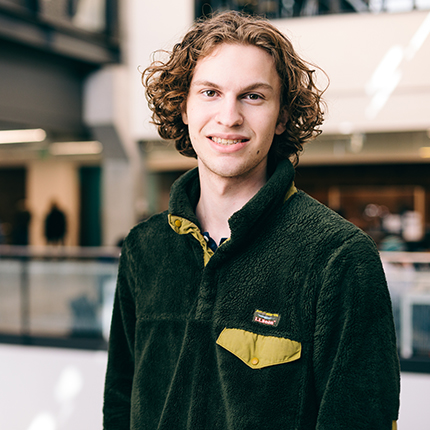 Eli Coltin had very clear expectations for his college experience.
Eli Coltin had very clear expectations for his college experience.
“What brought me to Purdue was the business school's focus on the quantitative side of business,” he says. “I specifically chose economics as my major because it has a broad focus of knowledge that I can apply to any field.”
Now a senior, the Honors College student didn’t stop with economics. He soon added majors in data science and computer science. “My economics electives let me branch out and try different things,” Coltin says. “I’m passionate about research and analytical problem-solving, so each major complements the other.”
In tandem with developing his technical background through coursework, Coltin has improved his communication skills through case competitions and group projects. “I’ve become pretty proficient in programming the last two years, but it’s just as important to be able to present that knowledge,” he says. “Especially in data science, if you can't relay the information or research that you’ve gathered, it's not really useful in the first place.”
Among his favorite courses was Geospatial Analytics, offered through the Honors College. “I believe analytics can help legislators make better decisions about the neighborhoods and citizens they serve,” Coltin says. “My final project used my own metrics to look at geographical data of Chicago’s neighborhoods to determine which areas are doing well and which aren’t. I thought it was an interesting way to combine programming with economic wellbeing.”
Coltin took a similar approach in a project examining resident retention in disadvantaged neighborhoods in the City of Lafayette. “Numbers in a database can be used to generate real results with real impact that helps real people,” he says. “In Lafayette, less that 1 percent of data on community revitalization has been analyzed, so one of the most difficult parts of my research was choosing what data to focus on.”
Local researchers and service-learning courses at Purdue have primarily been exploring quality of life issues qualitatively, speaking directly with residents. Spurred on by the pandemic, Coltin and his faculty mentor took a numbers approach.
“Due to COVID-19, community interaction became much more difficult,” says Coltin. “This gave me a great opportunity to leverage my interest and skillset in data analytics and use those techniques to derive insights and results from quantitative data about the community.”
Working alongside Honors College Professor Jason Ware, he analyzed 3,000 Lafayette, Indiana, households for demographic trends that influence how long residents say in the area. Coltin presented his results to city leaders earlier this year and shared the project nationally via Posters on the Hill, a prestigious national event that highlights the importance of undergraduate research at a federal level while celebrating student work.
He used Python — one of the world’s most popular programming languages and the number one language for data science — to organize, analyze, and visualize the data in a way that would be accessible to non-experts.
Coltin is looking forward to talking with policymakers about his findings and well as his hopes for future research. “So much important information could be analyzed to aid in determining the best outcome for citizens, and I feel it is important to utilize analytics to make more well-informed decisions which will impact a community,” he says.
In addition to his research, Coltin has completed two internships while at Purdue, the first with the Bank of New York Mellon in their operations and technologies area and another with Goldman Sachs as a summer engineering analyst.
“My internships allowed me to see technology in the finance world as well as what skills from the classroom are actually useful,” he says. “It gave me insight into what life is like outside of academia.”
As for his future plans, Coltin remains open to new opportunities. “I’d like to work somewhere at the intersection of economics, data science and computer science, whether that’s in financial technology or another technical field,” he says. “I want a career where I can continue growing, learning and researching rather than focus on a particular job.”

